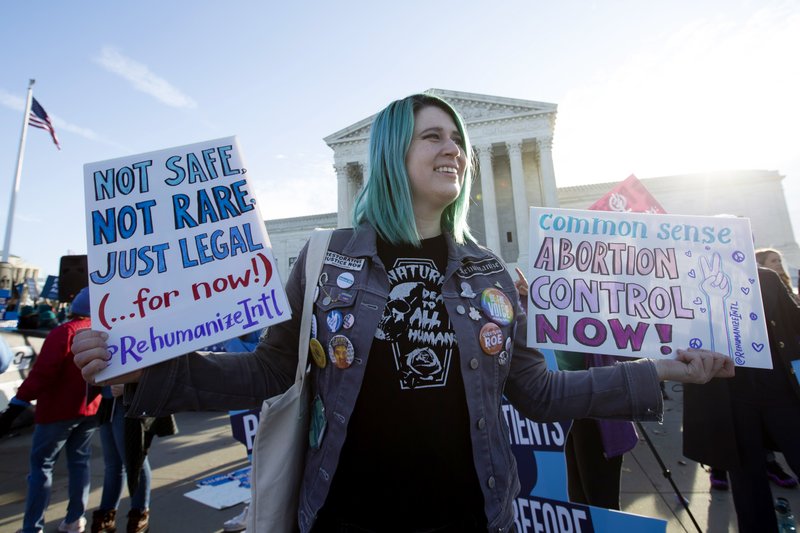WASHINGTON -- The Supreme Court heard its first major abortion case of the Trump era Wednesday, leaving Chief Justice John Roberts as the likely deciding vote.
A decision should come by late June in the court's look at a Louisiana dispute on abortion rights.
Outside the court, protesters on both sides filled the sidewalks just as they have for earlier high court cases on abortion.
Senate Democratic leader Charles Schumer of New York was at the rally and drew criticism from Roberts with remarks he made about Justices Neil Gorsuch and Brett Kavanaugh.
[Video not showing up above? Click here to watch » youtube.com/embed/qHGrzoS9AbE]
"You have released the whirlwind, and you will pay the price. You will not know what hit you if you go forward with these awful decisions," Schumer said, naming the two appointees of President Donald Trump, according to video of the rally available online.
Roberts said the comments were "inappropriate" and "dangerous."
The case comes at a time when several states have passed laws, being challenged in the courts, that would ban abortions after a fetal heartbeat is detected, as early as six weeks.
The justices are weighing a Louisiana law requiring doctors who perform abortions to have admitting privileges at a nearby hospital. A federal judge found that just one of Louisiana's three abortion clinics would remain open if the law is allowed to take effect. The federal appeals court in New Orleans, though, upheld the law, setting up the Supreme Court case.
Justice Ruth Bader Ginsburg noted, as she had before, that "among medical procedures, first trimester abortion is among the safest, far safer than childbirth." The abortion clinic in Shreveport at the heart of the case reported transferring just four patients to a hospital out of roughly 70,000 it has treated over 23 years, Justice Elena Kagan noted.
Justice Samuel Alito said the clinic had once, in 2010, had its license suspended.
In question is whether the court will overrule a 2016 decision in which it struck down a similar law in Texas. Since then, Donald Trump was elected president and has appointed two justices, Gorsuch and Kavanaugh. Even with those two additions to the court, Roberts almost certainly holds the deciding vote.
[Gallery not loading above? Click here for more photos » arkansasonline.com/35rally/]
When the justices temporarily blocked the Louisiana law from taking effect a year ago, Roberts joined the court's four liberal justices to put it on hold. Kavanaugh and Gorsuch were among the four conservatives who would have allowed the law to take effect.
Those preliminary votes do not bind the justices when they undertake a thorough review of an issue, but they often signal how a case will come out.
In more than 14 years as chief justice, Roberts has generally voted to uphold abortion restrictions, including in the Texas case four years ago.
The court in the Texas case found there was no benefit to the women the law was ostensibly intended to help and struck it down as an "undue burden" on women's right to an abortion in violation of the Constitution.
"I understand the idea that the impact might be different in different places, but as far as the benefits of the law, that's going to be the same in each state, isn't it?" Roberts asked Louisiana Solicitor General Elizabeth Murrill.
The Louisiana and Texas situations are not identical, Murrill told the court. "The laws are different, the facts are different, the regulatory structures are different," Murrill said.
Roberts' inquiry seemed to dovetail with questions from Kavanaugh, whose interest was in discerning whether admitting privileges laws would still impose an ""undue burden" in a state that made it easy for abortion providers to get them.
"Could an admitting privileges law of this kind ever have a valid purpose, in your view?" Kavanaugh asked lawyer Julie Rikelman, representing the Shreveport clinic.
Rikelman replied: "No, Your Honor. The medical consensus against these laws is clear."
The court also has agreed to review whether abortion providers have the right to go into court to represent the interests of women seeking abortions. This is known as third-party standing.
In a statement regarding Schumer's comments against the justices, his spokesman Justin Goodman criticized Roberts, saying that "to follow the right wing's deliberate misinterpretation of what Sen. Schumer said" shows the chief justice "does not just call balls and strikes."
Goodman said Schumer's comments "were a reference to the political price Senate Republicans will pay."
Roberts, who in 2018 rebuked Trump for the president's criticism of an "Obama judge," had jumped to his colleagues' defense after Schumer's remarks. "Justices know that criticism comes with the territory, but threatening statements of this sort from the highest levels of government are not only inappropriate, they are dangerous," Roberts said in a statement.
A Section on 03/05/2020
